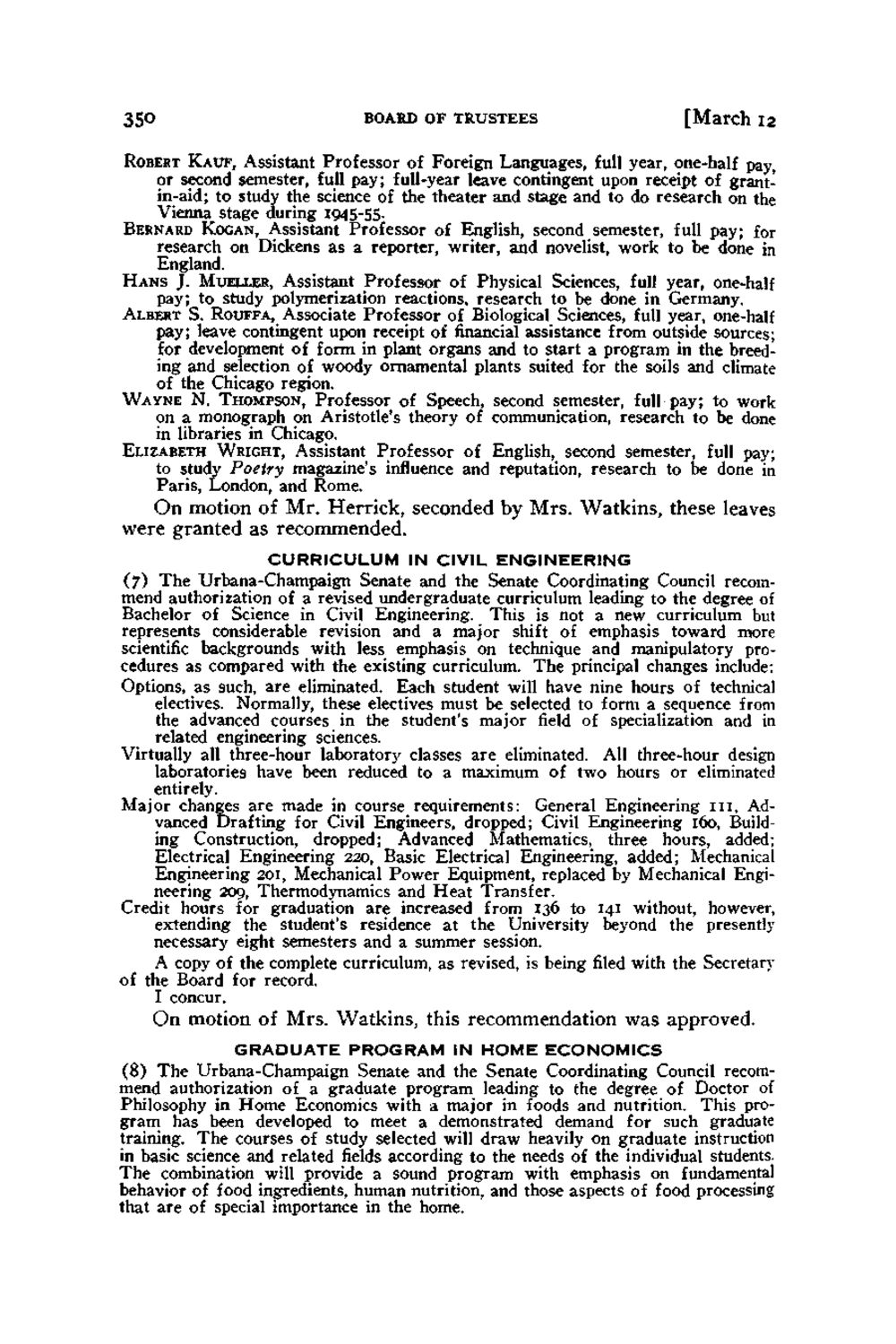| |
| |
Caption: Board of Trustees Minutes - 1960
This is a reduced-resolution page image for fast online browsing.

EXTRACTED TEXT FROM PAGE:
35° BOARD OF TRUSTEES [March 12 ROBERT K A U F , Assistant Professor of Foreign Languages, full year, one-half pay, or second semester, full pay; full-year leave contingent upon receipt of grantin-aid; to study the science of the theater and stage and to do research on the Vienna stage during 1945-55. BERNARD KOGAN, Assistant Professor of English, second semester, full pay; for research on Dickens as a reporter, writer, and novelist, work to be done in England. H A N S J. MUELLER, Assistant Professor of Physical Sciences, full year, one-half pay; to study polymerization reactions, research to be done in Germany. ALBERT S. ROUFFA, Associate Professor of Biological Sciences, full year, one-half pay; leave contingent upon receipt of financial assistance from outside sources; for development of form in plant organs and to start a program in the breeding and selection of woody ornamental plants suited for the soils and climate of the Chicago region. W A Y N E N . THOMPSON, Professor of Speech, second semester, full pay; to work on a monograph on Aristotle's theory of communication, research to be done in libraries in Chicago. ELIZABETH W R I G H T , Assistant Professor of English, second semester, full pay; to study Poetry magazine's influence and reputation, research to be done in Paris, London, and Rome. O n m o t i o n of M r . H e r r i c k , seconded b y M r s . W a t k i n s , these leaves w e r e g r a n t e d as r e c o m m e n d e d . C U R R I C U L U M IN CIVIL ENGINEERING (7) T h e Urbana-Champaign Senate and the Senate Coordinating Council recommend authorization of a revised undergraduate curriculum leading to the degree of Bachelor of Science in Civil Engineering. This is not a new curriculum but represents considerable revision and a major shift of emphasis toward more scientific backgrounds with less emphasis on technique and manipulatory procedures as compared with the existing curriculum. T h e principal changes include: Options, as such, are eliminated. Each student will have nine hours of technical electives. Normally, these electives must be selected to form a sequence from the advanced courses in the student's major field of specialization and in related engineering sciences. Virtually all three-hour laboratory classes are eliminated. All three-hour design laboratories have been reduced to a maximum of two hours or eliminated entirely. Major changes are made in course requirements: General Engineering i n , Advanced Drafting for Civil Engineers, dropped; Civil Engineering 160, Building Construction, dropped; Advanced Mathematics, three hours, added; Electrical Engineering 220, Basic Electrical Engineering, added; Mechanical Engineering 201, Mechanical Power Equipment, replaced by Mechanical Engineering 209, Thermodynamics and H e a t Transfer. Credit hours for graduation are increased from 136 to 141 without, however, extending the student's residence at the University beyond the presently necessary eight semesters and a summer session. A copy of the complete curriculum, as revised, is being filed with the Secretary of the Board for record. I concur. O n m o t i o n of M r s . W a t k i n s , this r e c o m m e n d a t i o n w a s a p p r o v e d . GRADUATE PROGRAM IN H O M E ECONOMICS (8) The Urbana-Champaign Senate and the Senate Coordinating Council recommend authorization of a graduate program leading to the degree of Doctor of Philosophy in Home Economics with a major in foods and nutrition. This program has been developed to meet a demonstrated demand for such graduate training. T h e courses of study selected will draw heavily on graduate instruction in basic science and related fields according to the needs of the individual students. T h e combination will provide a sound program with emphasis on fundamental behavior of food ingredients, human nutrition, and those aspects of food processing that are of special importance in the home.
| |